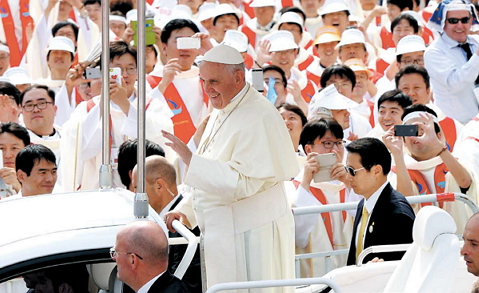
[Conglomerates] Conglomerates face changes
The hottest topic in Korean big business circles this year was no doubt a generation shift that was brought to surface by the poor health of Samsung Group chairman Lee Kun-hee, who suffered a heart attack in May. Lee is said to be recovering, but is still unable to return to the company. As the 72-year-old business magnate’s hospitalization dragged on, the nation’s largest conglomerate was taking steps for handing the chairman’s managerial authority to his children ― Jay-yong, Boo-jin and Seo-hyun.
As part of the group’s succession plan, Samsung has picked up the pace in its business reorganization and the stock listings of its affiliates, including Samsung SDS and Cheil Industries, to raise the funds for covering the astronomical succession cost.
In addition to the changing social perception, the government also has been piling pressure on the nation’s largest industrial groups to make bigger social and economic contributions. The push from Finance Minister Choi Kyung-hwan for companies to hand around bigger dividends, and for them to make more investments by dipping into their cash reserves, was a part of a bigger plan for conglomerate reform. An unprecedented prosecutorial investigation into Korean Air Lines over the nut controversy was another example of how the government would deal with the chaebol, according to industry watchers.

[Finance] Scandals hit financial sector
Korea’s financial industry has been embroiled with a string of unpleasant issues that includes a nationwide leak of customer information that left consumers uneasy about leaving their personal data with financial institutions. Early this year, three major card companies including KB Kookmin Bank, Lotte Card and NongHyup Bank were hit hard by massive information leaks, which affected up to 15 million clients. The incident ignited a storm of anger and litigation against the firms. The three credit card companies faced three-month business suspensions, while their chiefs and executives resigned their posts. They also lost millions of clients along the way.
The industry suffered a lackluster performance, resulting in 5,000 employees being laid off and 119 bank branches shuttered. The World Economic Forum said Korea’s financial competitiveness dropped to No. 80 among 144 countries, from No. 23 a decade ago.
An internal power struggle in KB Financial Group was another big issue in the financial industry. Constant strife between the group chairman and the bank’s chief over whether to switch the group’s computer system eventually led both to resign. Some critics say the internal conflict was caused by the group’s high dependency on its bank, which accounts for 75 percent of the group’s profit. This imbalance has made the powerful banking unit’s chief snub the group head’s interference. Other experts, however, view more underlying problem lies in the group’s “revolving door” employment practices.
The unhealthy relationship between politics and financial companies, which was often criticized for undermining the firms’ competitiveness, has not only been limited to KB Financial Group. When Woori Bank unexpectedly nominated Lee Kwang-goo, its vice president, to a chief position this month and KDB Securities appointed Hong Sung-kook, its research center chief, as its new head in November, speculation was rife over their political connections. Lee and Hong are among many in the local finance sector who belong to a clique of graduates from Sogang University ― the alma mater of President Park Geun-hye.
A new trend has taken off as more banks are forming closer ties with tech firms to offer upgraded mobile services. Competition between the financial institutions and the tech giants have become fiercer. Following the nation’s most popular messaging app Kakao’s launch of the mobile payment service “Bank Wallet Kakao” in November, Naver, the nation’s top Internet portal, is expected to launch similar services early next year. Samsung Electronics has recently added a money transfer function to its digital wallet service “Samsung Wallet” by partnering with local card companies.

[IT & Technology] Tech suffers market glut
Korea hosted the ITU Plenipotentiary Conference ― an international global meeting for information and communication technology policies ― in Busan in October. Around 3,000 officials, executives and experts from 70 nations gathered to discuss how to tackle issues facing the world’s ICT sector, such as technology disparity between rich and underprivileged nations, and to promote cooperation among market players to establish standards for technology such as the fifth-generation mobile network.
One of the topics that took the center stage of the plenipotentiary meeting ― and in the global IT sector, for that matter ― was the 5G mobile network.
The mobile network boasts transfer speeds of up to 100 Gbps, around 1,000 times faster than the current Long Term Evolution, or 4G. It enables mobile users to download a high-definition movie file in one second.
At the ITU, global mobile manufacturers and carriers, including Samsung Electronics and Japan’s NTT Docomo, shared their progress in developing the new communications technology and opinions on the related policies. Governments, private firms and academics have been paying keen attention to 5G as the technology will serve as the backbone of the Internet of Things. Gartner forecast that the number of connected objects will increase from 2.6 billion in 2013 to 26 billion by 2020, when the 5G services are expected to be commercialized in earnest.
One area that the local IT sector did not shine in was devices. Samsung and LG showcased a slew of third-generation wearable devices this year, but they did not make much of a mark in the quickly saturating market. Consumers appeared to be less than awed by the new devices that were launched, and less hope is being pinned on wearables to give the industry the leg up its needs.
Samsung Electronics suffered a huge drawback in smartphone sales this year despite being the world’s No. 1 manufacturer. LG Electronics, despite having showcased new smartphones ranging from low- to high-end, it was pushed to the world’s fourth-largest smartphone maker this year. The huge inroads being made by Chinese manufacturers such as Xiaomi is threatening the stronghold of local handset makers.

[Auto & Aviation] Tough year for carmakers
Hyundai Motor Group’s hefty spending on its new global headquarters in Seoul was one of the hottest issues within the automotive industry this year. In a highly publicized bidding war with Samsung in September, the Korean auto giant secured an 80,000-square-meter Gangnam site for 10.5 trillion won ($10 billion), about three times its appraised value. Opinions are still divided on Hyundai’s hefty bid, but the carmaker calls it a crucial investment for the next big leap.
For domestic carmakers, the rise of foreign brands continued to be a threat. The combined market share of foreign-brand cars is expected to hit a record 15 percent, about 200,000 vehicles, this year, industry watchers predict. Other challenges for both local and import carmakers included the growing emphasis on fuel economy accuracy demanded by the government and society. The first-ever compensations for the discrepancies between the stated and actual fuel ratings were also given to car owners.
For the nation’s top two carriers Korean Air and Asiana Airlines, it has been an exceptionally tough year, and not just in terms of business.
Most recently, public backlash has been escalating about the “nut rage” row caused by a Korean Air executive. Heather Cho, the eldest daughter of chairman Cho Yang-ho, is suspected of violating aviation law and using violence on the plane. Amid claims that the company attempted to cover up the incident by pressuring flight attendants, the No. 1 air carrier is expected to continue to suffer for some time in the aftermath.
Its local rival Asiana Airlines was also slapped with a 45-day business suspension from the government as a penalty for its passenger jet accident last year at San Francisco Airport. The sanction is expected to cost 15 billion won in sales losses, with its sales network and reputation hit hard.

[Oil Refinery & Construction] Refiners, builders in doldrums
The fall in crude prices over the year has led to disappointing performances of South Korean oil refiners and builders. The November decision of the Organization of Petroleum Exporting Countries against reducing its crude oil production despite the oversupply in the oil market has pushed oil prices below levels seen during the 2008 global financial crisis. As a result, Korean refiners, which have been raising their profit margins by processing crude oil into gasoline and diesel, slumped on a worsening cracking revenue. The nation’s four refiners are headed for losses of up to 1 trillion won ($907 million) this year, according to industry insiders.
The local construction industry has hit a snag as the global economy continued to remain sluggish, leading to a fall in construction orders. The country’s leading builders, in which sales from overseas businesses took up more than 30 percent of its total sales, were also hit by the sharp drop in oil price as number of petrochemical plant projects were called off. Local builders are expected to fall short of fulfilling the $70 billion goal of overseas construction orders for this year. As of Dec. 23, the sector was estimated to have received orders of up to $66 billion. Several builders were hit with massive fines amounting to trillions of won.
Further adding to their woes, Chinese construction firms, backed by the Chinese government’s support and capital strength, have begun to aggressively expand their operations overseas.

[Holy Visit] Pope fascinates Koreans
Pope Francis, the leader of the Roman Catholic Church, left a lasting impression on Koreans when he visited here from Aug. 14-18.
His every move was heavily covered by the media, which paid a great deal of attention to his personal humility and approachable demeanor, something that Koreans say they rarely find in their leaders. Everywhere he went, he was greeted by huge crowds.


[Chinese Rush] Rush of Chinese tourists
The number of Chinese tourists to Korea surged this year with about 5.7 million visiting the country from January to November. They accounted for about 43 percent of total foreign tourist arrivals, up from 40.9 percent in the same period last year.
There were nearly three times more Chinese than Japanese tourists, who were the largest group of foreign tourists before relations between Korea and Japan grew strained.
Chinese tourists were the biggest foreign consumer group, spending an average of $2,272 per person in 2013, according to the Korea Tourism Organization. Their travel expenses rose 64 percent in October alone from the same month last year thanks to the long Chinese National Day holiday.
Most Chinese tourists were in their 20s, 30s and 40s and preferred shopping and traveling individually. The number of tourists above the age of 61 also surged by 131 percent in October.
They mainly purchased Korean cosmetics by brands such as Sulwhasoo and Laneige, luxury items, rice cookers, Korean herbs and food products.

[Fallen Stars] The fallen stars of 2014
While 2014 was a feat-full year for the Korean entertainment industry, the year also left a solemn void with the loss of a number of celebrity figures.
Iconic ’90s rock musician Shin Hae-chul, 46, was pronounced dead on Oct. 27, following a massive heart attack caused by complications from surgery. He left behind his wife, columnist Yoon Won-hee, and their two children ― a 9-year-old daughter and a 7-year-old son. His death sparked a campaign to legislate a “Shin Hae-chul” law to better protect patients from possible medical accidents.
On Sept. 3, a fatal crash took the lives of K-pop idols EunB, 21, and RiSe, 23, of girl group Ladies’ Code. EunB was pronounced dead on the day of the crash, while fellow Ladies’ Code member RiSe passed away four days later after undergoing surgery that had to be cut short due to low blood pressure.
Award-winning actress Kim Ja-ock died of lung cancer on Nov. 16. She was 63 years old. Although Kim underwent surgery for colorectal cancer in April 2008 and resumed acting the following month, it is believed that the cancer had already spread to her lungs, causing her death last month. She is survived by her husband, recording artist Oh Seung-keun, and two children.

[Cinema Craze] New high in movie viewership
This year saw new viewership records on the silver screen. The Korean period action flick “Roaring Currents” drew the largest-ever viewership in the country’s cinematic history, while Hollywood imports, including “Frozen” and “Interstellar,” enjoyed successful runs as well.
“Roaring Currents” garnered 17.6 million viewers, surpassing the previous high of 13 million set by the 2009 Hollywood sci-fi flick “Avatar.” “Roaring Currents” tells the story of Adm. Yi Sun-sin, one of the nation’s most revered heroes from the Joseon era.
The other film that broke the coveted 10 million viewer mark was Disney’s “Frozen.” It became the first animated film to achieve the feat. Its success extended to the music industry as a number of songs on its soundtrack dominated local charts while many Korean singers sang cover versions of “Let It Go.”
The sci-fi flick “Interstellar” also joined the 10 million club this week, becoming the third-highest-grossing foreign picture after “Avatar” and “Frozen.”
Cable networks produced a number of hit programs threatening the three big broadcast networks KBS, MBC and SBS this year. The tvN series “Misaeng,” JTBC talk show “Non-summit” and tvN reality travel show “Youth Over Flowers” were at the white-hot center of cable channels’ high popularity.
Viewers identified with the no-nonsense cubicle drama “Misaeng,” were delighted to watch 11 expats talk about their cultures little known to Koreans with Korean hosts and guests in “Non-summit,” and were entertained with singer-songwriters and young actors’ backpacking adventures in “Youth Over Flowers.”
TvN’s cooking reality show “Three Meals a Day” proved that a dull plotline of two men cooking and washing dishes all day in the countryside can make people laugh. JTBC’s audition show “Hidden Singer” keeps its high ratings by making viewers watch with bated breath to see who will win or exit.
These programs have captivated the younger generation in their 20s and 30s, among others, by dealing with diverse topics candidly and freely. Producers with unconventional ideas, compelling stories and off-the-wall casting are also secrets behind the success.

[Cable on the Climb] The rise of cable TV
Cable networks produced a number of hit programs threatening the three big broadcast networks KBS, MBC and SBS this year. The tvN series “Misaeng,” JTBC talk show “Non-summit” and tvN reality travel show “Youth Over Flowers” were at the white-hot center of cable channels’ high popularity.
Viewers identified with the no-nonsense cubicle drama “Misaeng,” were delighted to watch 11 expats talk about their cultures little known to Koreans with Korean hosts and guests in “Non-summit,” and were entertained with singer-songwriters and young actors’ backpacking adventures in “Youth Over Flowers.”
TvN’s cooking reality show “Three Meals a Day” proved that a dull plotline of two men cooking and washing dishes all day in the countryside can make people laugh. JTBC’s audition show “Hidden Singer” keeps its high ratings by making viewers watch with bated breath to see who will win or exit.
These programs have captivated the younger generation in their 20s and 30s, among others, by dealing with diverse topics candidly and freely. Producers with unconventional ideas, compelling stories and off-the-wall casting are also secrets behind the success.







